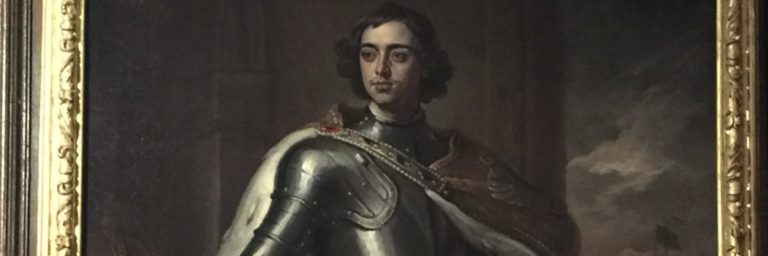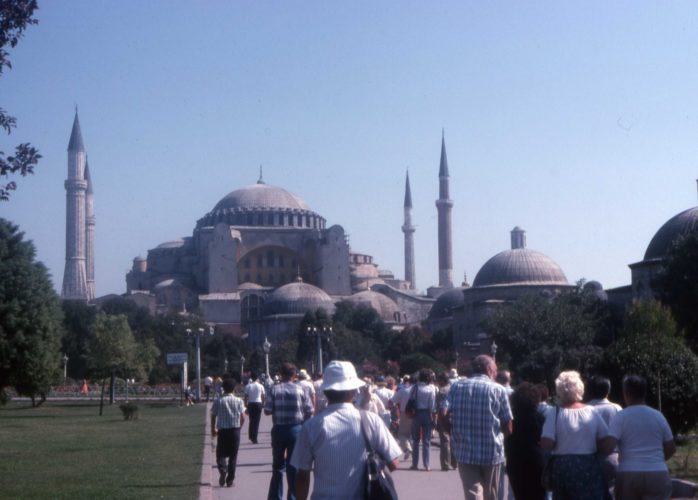The 19th Century in St. Petersburg was a time when Russian literary and musical expression matched or exceeded the best that Europe and America had to offer. See St. Petersburg: A Cultural History, and Natasha’s Dance: A Cultural History of Russia
. The novels written then give you enormous insight into the actual life and times of Russians at all levels of the social spectrum. Some of these works are very widely known, while others are familiar only to those with some background in Russian studies. We’ll give you a “greatest hits” approach to writers and composers and their most renown works.
The Soviet period is more difficult. Stalin fostered a literary community focused on “Socialist Realism,” which was intended to support the image of worker as hero. Much of it was heavily censored or directed. The most famous works by Russian writers and composers during this period were from “emigres” who had left Russia for life in Europe or America. As some were seriously critical of the Soviet system, they were controversial and fostered some backlash from the Soviet literary press. Again, some of these titles are well known. Others are more obscure. However, the books listed here are the cream of the crop.
Russian Literature:
Alexander Pushkin: Considered the Granddaddy of Russian Literature and its first great novelist.
- Boris Godunov: a drama in verse
, 1825, the novel inspired Mussorgsky’s opera
- Mozart and Salieri: The Little Tragedies
, 1830, the story in verse inspired the movie, “Amadeus”
- Eugene Onegin: A Novel in Verse (Oxford World’s Classics)
, 1837, the novel inspired the opera by Tchaikovsky
Nikolai Gogol: Storyteller and satirist. He loved to poke fun at the upper crust.
- The Collected Tales of Nikolai Gogol
, including his most famous short stories, “The Overcoat”, “The Nose”, and “Diary of a Madman”.
- Taras Bulba (Modern Library Classics)
, 1842, a characterization of the Ukrainian Cossack culture, inspired the movie
- Dead Souls
, 1842, a very famous satire about the government policies for serfdom
Ivan Turgenev:
- Fathers and Sons (Penguin Classics)
, 1862, a controversial commentary on generational differences
Leo Tolstoy: Possibly one of the greatest novelists anytime, anywhere
- War and Peace (Vintage Classics)
, 1869, renown novel about Russia’s nobility and its foibles, versus Napoleon
- Anna Karenina
, 1877, powerful, controversial love story, inspired the famous movie
- The Death of Ivan Ilyich (Bantam Classics)
, 1886, famous social commentary about the meaning of life
Fyodor Dostoyevsky: Another titan of Russian literature and the universal human condition
- Notes from Underground (Vintage Classics)
, 1864, a short but very challenging philosophical workout
- Crime and Punishment
, 1866, an examination of the limits of moral values
- The Idiot (Vintage Classics)
, 1869, It may be a little uncomfortable to realize that you identify with the idiot
- The Possessed (The Devils)
, 1872, This one will have you questioning your concept of God
- The Brothers Karamazov
, 1880, a wide-ranging critique of Russian society told through colorful characters
Anton Chekhov: Master playwright whose works are still performed internationally
- The Seagull
, 1896, a play about the challenges of artists in love
- Uncle Vanya
, 1896, a play examining life’s regrets
- Lady with Lapdog and Other Stories
, 1899, a famous short story about an adulterous affair
- The Three Sisters
, 1900, a play about the search for meaning in everyday life
- The Cherry Orchard
, 1904, the play symbolizes the confusion between the aristocracy, the bourgeoisie and the peasants in pre-revolutionary Russia.
Maxim Gorky: One of the first writers to support the revolutionary cause
- My Childhood (Classic, 20th-Century, Penguin)
, 1913, Growing up in the tough world of Tsarist Russia in the 1870’s
Boris Pasternak, émigré author
- Doctor Zhivago (Vintage International)
, 1957, Life and love through the Russian revolutions and WWII, inspired the movie
Mikhail Bulgakov, Soviet satirist
- The Master and Margarita: 50th-Anniversary Edition (Penguin Classics Deluxe Edition)
, originally written in 1940, though not published until 1967, The Devil visits atheistic Russia and a fantastical journey ensues
Vladimir Nabokov, superb émigré writer and literary professor
- Lolita
, 1955, the controversial novel about the abduction of a 12 year old girl
- Invitation to a Beheading
, 1959, a short though entertaining mental workout
- Pale Fire
, 1962, a poem within a novel that still defies interpretation
- Ada, or Ardor: A Family Chronicle (Vintage International)
, 1969, another controversial novel about forbidden sibling love
- Speak, Memory: An Autobiography Revisited
, 1951, an autobiography of Nabokov’s early life
- Look at the Harlequins!
, 1974, a spoof on his unauthorized biography
In addition to Nabokov’s novels, his collections of literary lectures are a literature of their own:
- Lectures on Literature
, 1980, on well-known European titles
- Lectures on Russian Literature
, 1981, the most famous Russian works
- Lectures on Don Quixote
, 1983, fascinating analysis of Cervantes’ classic
Aleksandr Solzhenitsyn, the essential critic of Stalinist Russia
- One Day in the Life of Ivan Denisovich
, 1962, a day in a Siberian prison camp, about the resiliency of life
- The Gulag Archipelago
, 1967, the author’s experience in the prison camp system
- In the First Circle
, 1968, the moral dilemmas of working for a tyrant
Russian Music: You have all heard of Tchaikovsky. He is the 800-pound gorilla of Russian musical composition. You could spend a very pleasant afternoon listening to his best works. The fourth movement of the Fifth Symphony is some of the most regal music ever written. He has excellent company with many other Russian composers from Tsarist and Soviet periods. Many of these works have numerous versions. Pick one with a great orchestra and enjoy!
Tchaikovsky:
- Ballets: Tchaikovsky: Swan Lake (Complete Ballet)
, Tchaikovsky: Romeo and Juliet/The Nutcracker Suite
, Tchaikovsky: The Sleeping Beauty
- The Romantic Symphonies: Tchaikovsky: The Six Symphonies
- Tchaikovsky: 1812 Overture / Capriccio Italien / Cossack Dance from Mazeppa
- The Concertos: Tchaikovsky: Piano Concerto No. 1 in B-flat minor / Violin Concerto in D Major
li>
Rachmaninoff:
Rimsky-Korsakov:
Mussorgsky:
Igor Stravinsky:
- Ballets: Stravinsky: The Firebird/Borodin: Music from Prince Igor
, Stravinsky: Petrushka / Pulcinella ~ Bernstein
, Stravinsky: The Rite of Spring
Sergei Prokofiev:
Dmitri Shostakovich:
- Shostakovich: Symphony No. 5 & Cello Concerto No. 1
- Shostakovich: Symphony 7, Leningrad
- Quartets Numbers 8 and 15: Shostakovich: The String Quartets
/li>
- Olympics Themes: Festive Overture / Symphony 5
, Dmitri Shostakovich: Music for Soviet Films “Zoya” Op. 64a and “Pirogov” Op. 76 ~ Melodiya Angel SR-40160
Russian Ballet: We cannot leave the topic of Russian Artistry without some mention of the spectacular Ballet personalities that have come from St. Petersburg and Moscow. If you can find examples of their performances, they would be worth watching. The Ballet companies are also legends. The St. Petersburg troupe was founded by Sergei Diaghilev as the Ballet Russe. Founded in 1909, it has morphed over the years into the Kirov Ballet, and, now, the Mariinsky Ballet. In Moscow, the Bolshoi Company has become the most famous name in Dance.
Impresario: Sergei Diaghilev, Diaghilev: A Life, and Diaghilev and the Golden Age of the Ballets Russes 1909-1929
The Men: Vaslav Nijinsky, George Balanchine, Rudolph Nureyev, Mikhail Baryshnikov
The Women: Tamara Karsavina, Anna Pavlova, Natalia Makarova





